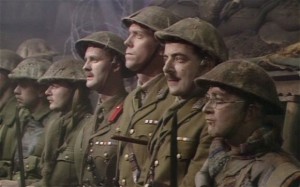There are lots of things I find fascinating about Michael Gove’s piece ‘Why does the Left insist on belittling true British heroes?’, published on 3 January 2014 in the Daily Mail.
My immediate reaction was: here is a Tory politician criticising others for using history to support their political persuasions, when his history curriculum reforms were initially rejected by numerous historians on the grounds that he was using the subject to impart British nationalism. Then I thought: is it really newsworthy that Blackadder has created a whole set of myths about the First World War? Historians have written many books on that one. A favourite of mine is Dan Todman’s The Great War, Myth and Memory published back in 2006. I was then struck by his audacity to link together the interpretations of the war that can be found in Blackadder, Oh! What a Lovely War and The Monocled Mutineer with the research and considered conclusions of Professor Sir Richard Evans. Then there was this little nugget. Gove has left out the work that was so crucial in creating the ‘Lion led by Donkeys’ myth, which seems to have exercised him so much. This was a book entitled The Donkeys, written by none other than British Conservative MP Alan Clark in 1961. I guess that one doesn’t fit so well with the title of the ‘Left belittling British heroes’. By the end, my fascination had turned to a weary dismay, when Gove wheeled out that old, patronising, ‘get back in your box all people who criticise the British establishment’, chestnut: it is only because we fought a war that we have freedom to debate it. Yawn.
I think what disappoints me the most, however, is that Gove’s article is preoccupied with the facile debate of whose interpretation is right or wrong. What we should be asking is: why did these myths about the war come about in the first place. Why have they been perpetuated? Why did they become so popular? Cultural historians don’t examine these films or television programmes for what they tell us the war. We look at them for what they tell us about the era in which they were composed. That’s what makes them interesting and so relevant. If we ask that question, then we quickly realise that Joan Littlewood’s Oh! What a Lovely War (1969) is less about the First World War, and more motivated by a class conflict and the need to warn the world about the perils of certain rulers in the context of the Cuban Missile Crisis and the Vietnam war. Asking these questions makes the First World War relevant to today. They encourage us to think critically about the views we hold of the war, and then look at what is happening in our society to encourage and cement those views. That’s what I’ll be looking for in the Centenary this coming year.

